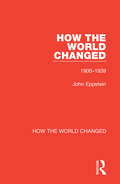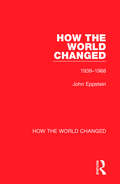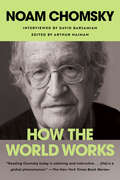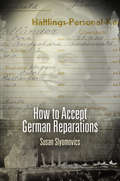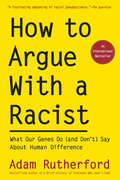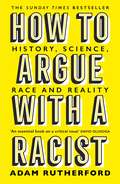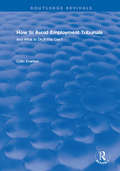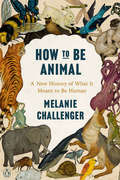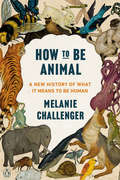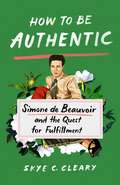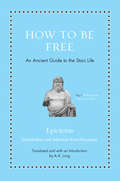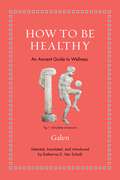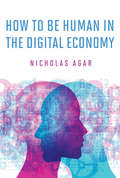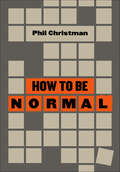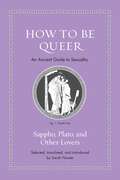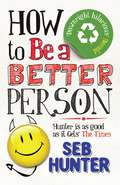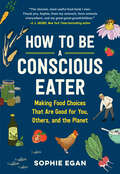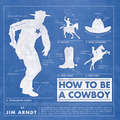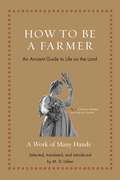- Table View
- List View
How the World Changed: Volume 1 1900-1939 (How the World Changed)
by John EppsteinFirst published in 1969, How the World Changed: Volume 1 1900-1939 is the first of two volumes that together outline the political history of the twentieth century up to 1968. This volume extends from 1900-1939 and explores life prior to, during, and after the First World War. In doing so, it covers significant political events and features of the period, including the Chinese Revolution and the rise of Japan, the different stages of the First World War, the peace process, the Russian Revolution, economic challenges, and the British Empire and Commonwealth.
How the World Changed: Volume 2 1939-1968 (How the World Changed)
by John EppsteinFirst published in 1969, How the World Changed: Volume 2 1939-1968 is the second of two volumes that together outline the political history of the twentieth century up to 1968. This volume covers the period from 1939-1968 and examines the history and politics of the Second World War and the state of the world in the years that followed it, including economic recovery, Soviet expansion, the Chinese People’s Republic, and shifts in world power.
How the World Eats: A Global Food Philosophy
by Julian BagginiFrom the bestselling author of How the World Thinks, an exploration of how we grow, make, buy and eat our food around the world—and a proposal for a global philosophy of food.How we live is shaped by how we eat. You can see this in the vastly different approaches to growing, preparing and eating food around the world, such as the hunter-gatherer Hadza in Tanzania whose sustainable lifestyle is under threat in a crowded planet, or Western societies whose food is farmed or bred in vast intensive enterprises. And most of us now rely on a complex global food web of production, distribution, consumption and disposal, which is now contending with unprecedented challenges. The need for a better understanding of how we feed ourselves has never been more urgent. In this wide-ranging and definitive book, philosopher Julian Baggini expertly delves into the best and worst food practises in a huge array of different societies, past and present. His exploration takes him from cutting-edge technologies, such as new farming methods, cultured meat, GM and astronaut food, to the ethics and health of ultra processed food and aquaculture, as he takes a forensic look at the effectiveness of our food governance, the difficulties of food wastage and the effects of commodification. Extracting essential principles to guide how we eat in the future, How the World Eats is a thought-provoking and illuminating call for a pluralistic, humane, resourceful and equitable global food philosophy that will guide us towards a food system fit for the twenty-first century and beyond.
How the World Works (Real Story Ser.)
by Noam ChomskyAn eye-opening introduction to the timelessly relevant ideas of Noam Chomsky, this book is a penetrating, illusion-shattering look at how things really work"Arguably the most important intellectual alive." —The New York TimesOffering something not found anywhere else, How the World Works is pure Chomsky, but tailored for those who are new to his work. The book is made up of meticulously edited speeches and interviews, and every dazzling idea and penetrating insight is kept intact and delivered in clear, accessible, reader-friendly prose.Originally published as a series of short works—What Uncle Sam Really Wants; The Prosperous Few and the Restless Many; Secrets, Lies and Democracy; and The Common Good—these volumes together sold nearly 600,000 copies. Now collected into one comprehensive anthology, How the World Works reveals how Chomsky&’s then-revolutionary ideas have only become more relevant as time has gone by.From the concept that extreme wealth and democracy cannot exist side-by-side; to how the assumptions of mainstream media purposefully limit the spectrum of acceptable opinion; to the decline of unions and workers&’ rights thanks to corporations and their unconstrained quest for profit, Chomsky&’s prescient theories of the future—not only the future of the United States, but of the world—make it very clear that our society is paying the price now for not heeding him then.
How to Accept German Reparations
by Susan SlyomovicsIn a landmark process that transformed global reparations after the Holocaust, Germany created the largest sustained redress program in history, amounting to more than $60 billion. When human rights violations are presented primarily in material terms, acknowledging an indemnity claim becomes one way for a victim to be recognized. At the same time, indemnifications provoke a number of difficult questions about how suffering and loss can be measured: How much is an individual life worth? How much or what kind of violence merits compensation? What is "financial pain," and what does it mean to monetize "concentration camp survivor syndrome"?Susan Slyomovics explores this and other compensation programs, both those past and those that might exist in the future, through the lens of anthropological and human rights discourse. How to account for variation in German reparations and French restitution directed solely at Algerian Jewry for Vichy-era losses? Do crimes of colonialism merit reparations? How might reparations models apply to the modern-day conflict in Israel and Palestine? The author points to the examples of her grandmother and mother, Czechoslovakian Jews who survived the Auschwitz, Plaszow, and Markkleeberg camps together but disagreed about applying for the post-World War II Wiedergutmachung ("to make good again") reparation programs. Slyomovics maintains that we can use the legacies of German reparations to reconsider approaches to reparations in the future, and the result is an investigation of practical implications, complicated by the difficult legal, ethnographic, and personal questions that reparations inevitably prompt.
How to Argue With a Racist (and Don't) Say About Human Difference: What Our Genes Do (and Don't) Say About Human Difference
by Adam RutherfordThis authoritative debunking of racist claims that masquerade as “genetics” is a timely weapon against the misuse of science to justify bigotry—now in paperback Race is not a biological reality. Racism thrives on our not knowing this. In fact, racist pseudoscience has become so commonplace that it can be hard to spot. But its toxic effects on society are plain to see: rising nationalism, simmering hatred, lost lives, and divisive discourse. Since cutting-edge genetics are difficult to grasp—and all too easy to distort—even well-intentioned people repeat stereotypes based on “science.” But the real science tells a different story: The more researchers learn about who we are and where we come from, the clearer it becomes that our racial divides have nothing to do with observable genetic differences. The bestselling author of A Brief History of Everyone Who Ever Lived explains in this explosive, essential guide to the DNA we all share.
How to Argue With a Racist: History, Science, Race and Reality
by Adam RutherfordTHE SUNDAY TIMES BESTSELLER'Nobody deals with challenging subjects more interestingly and compellingly than Adam Rutherford, and this may be his best book yet. This is a seriously important work' BILL BRYSON'A fascinating and timely refutation of the casual racism on the rise around the world. The ultimate anti-racism guide for data-lovers everywhere' CAROLINE CRIADO PEREZ ***Race is real because we perceive it. Racism is real because we enact it. But the appeal to science to strengthen racist ideologies is on the rise - and increasingly part of the public discourse on politics, migration, education, sport and intelligence. Stereotypes and myths about race are expressed not just by overt racists, but also by well-intentioned people whose experience and cultural baggage steer them towards views that are not supported by the modern study of human genetics. Even some scientists are uncomfortable expressing opinions deriving from their research where it relates to race. Yet, if understood correctly, science and history can be powerful allies against racism, granting the clearest view of how people actually are, rather than how we judge them to be.HOW TO ARGUE WITH A RACIST is a vital manifesto for a twenty-first century understanding of human evolution and variation, and a timely weapon against the misuse of science to justify bigotry.
How to Avoid Employment Tribunals: And What to Do If You Can't (Routledge Revivals)
by Colin EversonThis title was first published in 2002: The best way to avoid losing at an employment tribunal is to make sure that you don't get drawn into one. The author offers a practical training resource to help you understand the risks associated with employment tribunals, identify risk areas within your organization and, most important of all, provide you with the means to raise awareness amongst both managers and their employees and help them develop good people-management practice. At the heart of the resource are three compelling training case studies on unfair dismissal, racial discrimination and sexual discrimination. This resource also provides you with material to audit your current management practices and identify where and how to improve them.
How to Be Animal: A New History of What It Means to Be Human
by Melanie Challenger&“A brilliant, thought-provoking book.&” —Matt Haig, New York Times bestselling author of The Midnight Library A wide-ranging take on why humans have a troubled relationship with being an animal, and why we need a better oneHuman are the most inquisitive, emotional, imaginative, aggressive, and baffling animals on the planet. But we are also an animal that does not think it is an animal. How well do we really know ourselves?How to Be Animal tells a remarkable story of what it means to be human and argues that at the heart of our existence is a profound struggle with being animal. We possess a psychology that seeks separation between humanity and the rest of nature, and we have invented grand ideologies to magnify this. As well as piecing together the mystery of how this mindset evolved, Challenger's book examines the wide-reaching ways in which it affects our lives, from our politics to the way we distance ourselves from other species. We travel from the origin of homo sapiens through the agrarian and industrial revolutions, the age of the internet, and on to the futures of AI and human-machine interface. Challenger examines how technology influences our sense of our own animal nature and our relationship with other species with whom we share this fragile planet.That we are separated from our own animality is a delusion, according to Challenger. Blending nature writing, history, and moral philosophy, How to Be Animal is both a fascinating reappraisal of what it means to be human, and a robust defense of what it means to be an animal.
How to Be Animal: A New History of What It Means to Be Human
by Melanie ChallengerWhat makes us human, and why are we so sure we're different from other animals?Humans are the most inquisitive, emotional, imaginative, aggressive, and baffling animals on the planet. But how well do we really know ourselves? How to Be Animal rewrites the remarkable human story and argues that at the heart of our psychology is a profound struggle with being animal.Most of our effects on the planet are the consequences of technological improvements and advances in our understanding of natural mechanisms. But why did this cognitive and technological edge come about in the first place and what kind of being has it made us? In How to Be Animal, Challenger brilliantly argues that this dizzying trajectory is the result of a singular characteristic of our species: the struggle with being an animal. Using a combination of memoir, historical texts, interweaving interviews and cultural and environmental history, How to Be Animal is lively and thought-provoking, bursting with ideas. This is a book for anyone who has ever contemplated what humans are and what makes our species so simultaneously brilliant and awful. Even more so, it is a book that asks tantalizing philosophical questions, such as whether and how human life matters. How to Be Animal is a tough-minded but ultimately sympathetic portrait of humanity. It exposes human beings as extraordinary animals defined by a profound struggle. In the third millennium, the way humans respond to being an animal among animals is the greatest and most inspiring challenge we face.
How to Be Authentic: Simone de Beauvoir and the Quest for Fulfillment
by Skye C. ClearyAn illuminating introduction to the philosophy of Simone de Beauvoir and its relevance to modern lifeIn an age of self-exposure, what does it mean to be authentic?“Authenticity” has become attenuated to the point of meaninglessness; everyone says to be yourself, but what that means is anyone’s guess. For existential philosopher Simone de Beauvoir, authenticity is not the revelation of a true self, but an exhilarating quest towards fulfillment. Her view, central to existentialism, is that we exist first and then spend the rest of our lives creating—not discovering—who we are. To be authentic is to live in pursuit of self-creation and self-renewal, with many different paths towards diverse goals.How to Be Authentic is a lively introduction to Simone de Beauvoir's philosophy of existentialism, as well as an exploration of the successes and failures that Beauvoir and other women have experienced in striving towards authenticity. Skye C. Cleary takes us through some of life’s major relationships and milestones: friendship; romantic love; marriage; children; and death, and examines how each offers an opportunity for us to stretch toward authenticity. While many people don’t get to choose their path in life—whether because of systemic oppression or the actions of other individuals—Cleary makes a compelling case that Beauvoir’s ideas can help us become more conscious of living purposefully, thoughtfully, and with vitality, and she shows us how to do so in responsible ways that invigorate every person’s right to become poets of their own lives.
How to Be Danish: A Journey to the Cultural Heart of Denmark
by Patrick KingsleyPart reportage, part travelogue, this is a fascinating introduction to contemporary Danish culture for anyone who wants to know more about the happiest nation in the world.Denmark is the country of the moment. The motherland of Borgen and The Killing, it&’s the runaway champion of Eurovision, and home to Noma, the world&’s most eccentric restaurant.But though we wear their sweaters and read their thrillers, how much do we really know about the Danes themselves? Part reportage, part travelogue, How to be Danish fills in the gaps – an introduction to contemporary Danish culture that spans politics, television, food, architecture and design. Welcome to the happiest country in the world.
How to Be Disabled in a Pandemic
by Mara Mills, et al.,A chronicle of ableism and disability activism in New York City during the COVID-19 pandemicHow to Be Disabled in a Pandemic documents the pivotal experiences of disabled people living in an early epicenter of COVID-19: New York City. Among those hardest hit by the pandemic, disability communities across the five boroughs have been disproportionately impacted by city and national policies, work and housing conditions, stigma, racism, and violence—as much as by the virus itself. Disabled and chronically-ill activists have protested plans for medical rationing and refuted the eugenic logic of mainstream politicians and journalists who “reassure” audiences that only older people and those with disabilities continue to die from COVID-19. At the same time, as exemplified by the viral hashtag #DisabledPeopleToldYou, disability expertise has become widely recognized in practices such as accessible remote work and education, quarantine, and distributed networks of support and mutual aid. This edited volume charts the legacies of this “mass disabling event” for uncertain viral futures, exploring the dialectic between disproportionate risk and the creativity of a disability justice response.How to Be Disabled in a Pandemic includes contributions by wide-ranging disability scholars, writers, and activists whose research and lived experiences chronicle the pandemic’s impacts in prisons, migrant detention centers, Chinatown senior centers, hospitals in Queens and the Bronx, subways, schools, housing shelters, social media, and other locations of public and private life. By focusing on New York City over the course of three years, the book reveals key themes of the pandemic, including hierarchies of disability "vulnerability," the deployment of disability as a tool of population management, and innovative crip pandemic cultural production. How to Be Disabled in a Pandemic honors those lost, as well as those who survived, by calling for just policies and caring infrastructures, not only in times of crisis but for the long haul.
How to Be Free: An Ancient Guide to the Stoic Life (Ancient Wisdom for Modern Readers)
by Epictetus Anthony LongA superb new edition of Epictetus’s famed handbook on Stoicism—translated by one of the world’s leading authorities on Stoic philosophyBorn a slave, the Roman Stoic philosopher Epictetus (c. 55–135 AD) taught that mental freedom is supreme, since it can liberate one anywhere, even in a prison. In How to Be Free, A. A. Long—one of the world’s leading authorities on Stoicism and a pioneer in its remarkable contemporary revival—provides a superb new edition of Epictetus’s celebrated guide to the Stoic philosophy of life (the Encheiridion) along with a selection of related reflections in his Discourses.Freedom, for Epictetus, is not a human right or a political prerogative but a psychological and ethical achievement, a gift that we alone can bestow on ourselves. We can all be free, but only if we learn to assign paramount value to what we can control (our motivations and reactions), treat what we cannot control with equanimity, and view our circumstances as opportunities to do well and be well, no matter what happens to us through misfortune or the actions of other people.How to Be Free features splendid new translations and the original Greek on facing pages, a compelling introduction that sets Epictetus in context and describes the importance of Stoic freedom today, and an invaluable glossary of key words and concepts. The result is an unmatched introduction to this powerful method of managing emotions and handling life’s situations, from the most ordinary to the most demanding.
How to Be Healthy: An Ancient Guide to Wellness (Ancient Wisdom for Modern Readers)
by GalenTimeless wisdom about how to be healthy in body and mind from one of the greatest physicians of the ancient worldThe second-century Greek physician Galen—the most famous doctor in antiquity after Hippocrates—is a central figure in Western medicine. A talented doctor, surgeon, writer, philosopher, teacher, pharmacologist, and inventor, Galen attended the court of Marcus Aurelius, living through outbreaks of plague (likely smallpox) that devastated the Roman Empire. He also served as physician for professional gladiators, boasting that only two fighters died during his first year (his predecessor had lost sixteen). In writings that provided the foundation of Western medicine up to the nineteenth century, Galen created a unified account of health and disease. In How to Be Healthy, practicing physician and classical historian Katherine Van Schaik presents a collection of Galen’s enduring insights about how we can take care of our bodies and minds, prevent disease, and reach a healthy old age.Although we now know that many of Galen’s ideas about physiology are wrong, How to Be Healthy shows that much of his advice remains sound. In these selections from his writings, presented in fresh translations, Galen discusses the art of medicine, exercise and diet, the mind-body connection, the difficulty of applying general medical principles to individuals, and much more. Featuring an introduction, brief commentaries that connect ancient medical practices to modern ones, and the original Greek on facing pages, How to Be Healthy offers an entertaining and enlightening new perspective on the age-old pursuit of wellness, from the importance of “the exercise with a small ball” to the benefits of “avoiding distress.”
How to Be Human in the Digital Economy (The\mit Press Ser.)
by Nicholas AgarAn argument in favor of finding a place for humans (and humanness) in the future digital economy.In the digital economy, accountants, baristas, and cashiers can be automated out of employment; so can surgeons, airline pilots, and cab drivers. Machines will be able to do these jobs more efficiently, accurately, and inexpensively. But, Nicholas Agar warns in this provocative book, these developments could result in a radically disempowered humanity.The digital revolution has brought us new gadgets and new things to do with them. The digital revolution also brings the digital economy, with machines capable of doing humans' jobs. Agar explains that developments in artificial intelligence enable computers to take over not just routine tasks but also the kind of “mind work” that previously relied on human intellect, and that this threatens human agency. The solution, Agar argues, is a hybrid social-digital economy. The key value of the digital economy is efficiency. The key value of the social economy is humanness.A social economy would be centered on connections between human minds. We should reject some digital automation because machines will always be poor substitutes for humans in roles that involve direct contact with other humans. A machine can count out pills and pour out coffee, but we want our nurses and baristas to have minds like ours. In a hybrid social-digital economy, people do the jobs for which feelings matter and machines take on data-intensive work. But humans will have to insist on their relevance in a digital age.
How to Be Less Stupid About Race: On Racism, White Supremacy, and the Racial Divide
by Crystal Marie FlemingA unique and irreverent take on everything that's wrong with our "national conversation about race"--and what to do about itHow to Be Less Stupid About Race is your essential guide to breaking through the half-truths and ridiculous misconceptions that have thoroughly corrupted the way race is represented in the classroom, pop culture, media, and politics. Centuries after our nation was founded on genocide, settler colonialism, and slavery, many Americans are kinda-sorta-maybe waking up to the reality that our racial politics are (still) garbage. But in the midst of this reckoning, widespread denial and misunderstandings about race persist, even as white supremacy and racial injustice are more visible than ever before.Combining no-holds-barred social critique, humorous personal anecdotes, and analysis of the latest interdisciplinary scholarship on systemic racism, sociologist Crystal M. Fleming provides a fresh, accessible, and irreverent take on everything that's wrong with our "national conversation about race." Drawing upon critical race theory, as well as her own experiences as a queer black millennial college professor and researcher, Fleming unveils how systemic racism exposes us all to racial ignorance--and provides a road map for transforming our knowledge into concrete social change. Searing, sobering, and urgently needed, How to Be Less Stupid About Race is a truth bomb and call to action for everyone who wants to challenge white supremacy and intersectional oppression. If you like Issa Rae, Justin Simien, Angela Davis, and Morgan Jerkins, then this deeply relevant, bold, and incisive book is for you.
How to Be Normal
by Phil Christman&“Erudite riffs on race, religion, masculinity and [more]. . . . A crisp set of essays that bring big social and cultural debates to a human level.&” —Kirkus Reviews Phil Christman is one of the best cultural critics working today. Or, as a reviewer of his previous book, Midwest Futures, put it, &“one of the most underappreciated writers of [his] generation.&” You may also know Phil from his columns in Commonweal and Plough, or his viral essay &“What Is It Like To Be A Man?&”, the latter adapted in his new book, How to Be Normal. Christman&’s second book includes essays on &“How To Be White,&” &“How to Be Religious,&” &“How To Be Married,&” and more, in addition to new versions of previously published essays. You&’ll also find brilliant analyses of middlebrow culture, bad movies, Mark Fisher, Christian fundamentalism, and more. With exquisite attention to syntax and prose, the astoundingly well-read Christman pairs a deceptively breezy style with radical openness. In his witty, original hands, seemingly &“normal&” subjects are rendered exceptional, and exceptionally. &“A probing and provocative collection.&” —Publishers Weekly &“Engaging a belles-lettristic negative capability, Christman takes on the big subjects while always remembering that the point of criticism is to more fully be a person, part of &‘our little attempts that we make at building a home in this world.&’&” —Ed Simon, The Millions &“Christman charts a frank and fearless guide for the perplexed, the battered, the exhausted, and the outraged.&” —Chris Lehmann, The New Republic &“Earnest and intense.&” —Richard Babcock, Wall Street Journal
How to Be Old: Lessons in Living Boldly from the Accidental Icon
by Lyn SlaterOne of Elle's Most Anticipated Nonfiction Books of 2024A personal memoir in which Lyn Slater, known on Instagram as &“Accidental Icon,&” brings her characteristic style, optimism, forward-thinking, and rules-are-meant-to-be-broken attitude to the question of how to live boldly at any age. When Lyn Slater started her fashion blog, Accidental Icon, at age sixty-one, she discovered that followers were flocking to her account for more than just her A-list style. As Lyn flaunted gray hair, wrinkles, and a megadose of self-acceptance, they found in her an alternative model of older life: someone who defied the stereotypes, refused to become invisible, and showed that all women have the opportunity to be relevant and take major risks at any stage of their life. Youth is not the only time we can be experimental. How to Be Old tells the ten-year story of Lyn&’s sixties, the sometimes-glamorous, sometimes-turbulent decade of Accidental Icon. This memoir is about the hopeful and future-oriented process of reinvention. It shows readers that while you can&’t control everything, what you can control is the way you think about your age and the creative ways you respond to the changes in your mind and body as they happen. Rather than trying to meet standards of youth and beauty as a measure of successful aging, Lyn promotes a more inclusive and empowering standard to judge our older selves by. In this paradigm-shifting memoir, Lyn exemplifies that even with its unique challenges, being old is just like any new beginning in your life and can be the best and most invigorating of all of life&’s phases, full of rebellion and reinvention, connection and creativity.
How to Be Queer: An Ancient Guide to Sexuality (Ancient Wisdom for Modern Readers)
by Sarah NooterAn irresistible anthology of ancient Greek writings that explore queer desire and loveEros, limb-loosening, whirls me about again,that bittersweet, implacable creature.—SapphoThe idea of sexual fluidity may seem new, but it is at least as old as the ancient Greeks, who wrote about queer experiences with remarkable frankness, wit, and insight. How to Be Queer is an infatuating collection of these writings about desire, love, and lust between men, between women, and between humans and gods, in lucid and lively new translations. Filled with enthralling stories, this anthology invites readers of all sexualities and identities to explore writings that describe many kinds of erotic encounters and feelings, and that envision a playful and passionate approach to sexuality as part of a rich and fulfilling life.How to Be Queer starts with Homer&’s Iliad and moves through lyric poetry, tragedy, comedy, philosophy, and biography, drawing on a wide range of authors, including Sappho, Plato, Anacreon, Pindar, Theognis, Aristophanes, and Xenophon. It features both beautiful poetry and thought-provoking prose, emotional outpourings and humorous anecdotes. From Homer&’s story of the relationship between Achilles and Patroclus, one of the most intense between men in world literature, to Sappho&’s lyrics on the pleasures and pains of loving women, these writings show the many meanings of what the Greeks called eros.Complete with brief introductions to the selections, and with the original Greek on facing pages, How to Be Queer reveals what the Greeks knew long ago—that the erotic and queer are a source of life and a cause for celebration.
How to Be a Better Person
by Seb HunterWhy is it so difficult to find the time to help others? When Seb Hunter became aware of a nagging ache in the place where his soul ought to be, he embarked on a two year odyssey of volunteering – with hilarious results. He collects litter, teaches pensioners how to use the internet, works at Oxfam (where he meets Gladys, his septuagenarian nemesis), mans a steam train line, becomes a star DJ on hospital radio, visits prisoners, and runs a very long way for charity... But will his quest for self-improvement be successful? How to Be a Better Person is the tale of a cynic's attempt to become a better person by helping others. For nothing. It's a volunteering call-to-arms! Oh no it's not! Well it is, sort of...
How to Be a Billionaire: Proven Strategies from the Titans of Wealth
by Martin S. FridsonA comprehensive picture of the real strategies and tactics that built the great business fortunes of modern times. Packed with engaging accounts of titans, How to Be a Billionaire will show you principles that can increase your wealth and business acumen.
How to Be a Conscious Eater: Making Food Choices That Are Good for You, Others, and the Planet
by Sophie EganA radically practical guide to making food choices that are good for you, others, and the planet. Is organic really worth it? Are eggs ok to eat? If so, which ones are best for you, and for the chicken—Cage-Free, Free-Range, Pasture-Raised? What about farmed salmon, soy milk, sugar, gluten, fermented foods, coconut oil, almonds? Thumbs-up, thumbs-down, or somewhere in between? Using three criteria—Is it good for me? Is it good for others? Is it good for the planet?—Sophie Egan helps us navigate the bewildering world of food so that we can all become conscious eaters. To eat consciously is not about diets, fads, or hard-and-fast rules. It&’s about having straightforward, accurate information to make smart, thoughtful choices amid the chaos of conflicting news and marketing hype. An expert on food&’s impact on human and environmental health, Egan organizes the book into four categories—stuff that comes from the ground, stuff that comes from animals, stuff that comes from factories, and stuff that&’s made in restaurant kitchens. This practical guide offers bottom-line answers to your most top-of-mind questions about what to eat. &“The clearest, most useful food book I own.&”—A. J. Jacobs, New York Times bestselling author
How to Be a Cowboy
by Jim ArndtExplore every facet of being a cowboy with essays and colorful photos in this guide from the author of Buckaroo Boots and Art of the Buckle.How to be a Cowboy is a compendium of knowledge and insight, wit and wisdom, and all-around resource for every aspect of cowboy life. It includes the least you need to know about ranching, rodeoing, cooking, music, dancing, yodeling, lingo (like &“dude,&” &“bronc,&” and &“hoss&”), cowboy poetry, hats, boots (like boot history and how to choose a pair for yourself), spurs, shirts, horses, hats, buckles, denim, and also how to walk like a cowboy. Discover the top twenty cowboy movies and top western novels. You&’ll even find advice from cowboy icon Will Rogers.&“It&’s the rich color camerawork that really compels, and Arndt&’s classy shots of elaborately designed boots, shirts, blue jeans and hats, plus peripheral cowboy gear, are enough to make a guy chuck the 9-to-5 and head out to the wild, wild West.&”—Martin Brady, BookPage
How to Be a Farmer: An Ancient Guide to Life on the Land (Ancient Wisdom for Modern Readers)
by M. D. Usher Mark UsherA delightful anthology of classical Greek and Roman writings celebrating country living—ranging from a philosophy of compost to hymns to the gods of agricultureWhether you farm or garden, live in the country or long to move there, or simply enjoy an occasional rural retreat, you will be delighted by this cornucopia of writings about living and working on the land, harvested from the fertile fields of ancient Greek and Roman literature. An inspiring antidote to the digital age, How to Be a Farmer evokes the beauty and bounty of nature with a rich mixture of philosophy, practical advice, history, and humor. Together, these timeless reflections on what the Greeks called boukolika and the Romans res rusticae provide an entertaining and enlightening guide to a more meaningful and sustainable way of life.In fresh translations by classicist and farmer M. D. Usher, with the original texts on facing pages, Hesiod praises the dignity of labor; Plato describes the rustic simplicity of his ideal republic; Varro dedicates a farming manual to his wife, Fundania (“Mrs. Farmer”); and Vergil idealizes farmers as residents of the Golden Age. In other selections, Horace extols the joys of simple living at his cherished country farm; Pliny the Elder explains why all culture stems from agriculture; Columella praises donkeys and tells how to choose a ram or a dog; Musonius Rufus argues that farming is the best livelihood for a philosopher; and there is much more.Proof that farming is ultimately a state of mind we should all cultivate, How to Be a Farmer will charm anyone who loves nature or its fruits.
